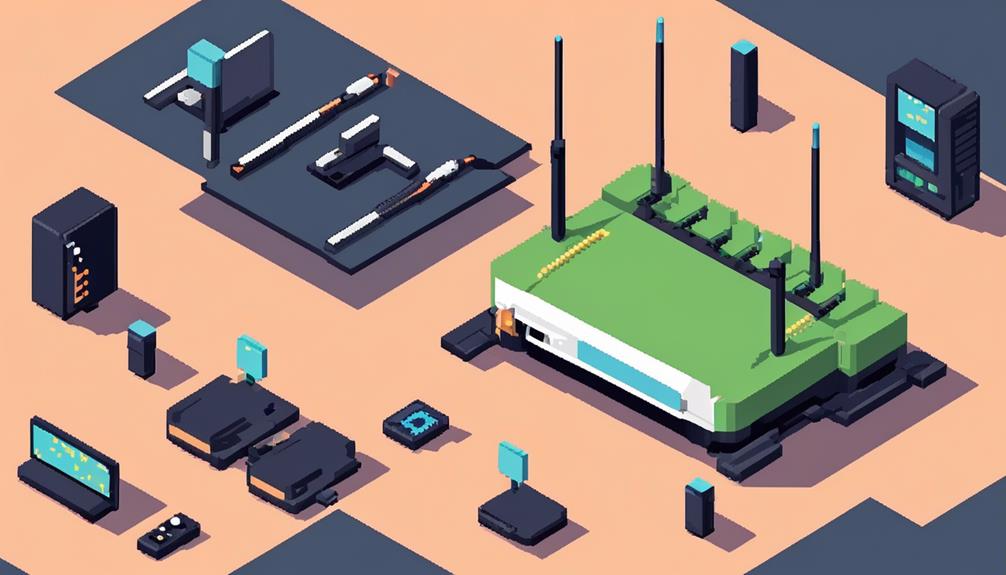In today's ever-evolving technological landscape, the need for customizing wireless hardware to meet specific needs has become more critical than ever before.
Businesses and organizations across various industries are constantly seeking tailored solutions to address their unique requirements. These requirements can range from compliance with regulatory standards to integration of specific features or the ability to scale and adapt to changing environments.
This discussion aims to explore the importance of customizing wireless hardware, identifying specific needs, the benefits and considerations of customization, successful case studies, effective strategies, future trends, and the key factors to consider when choosing the right provider for customized solutions.
By delving into these aspects, we will uncover the intricate details and complexities involved in customizing wireless hardware. This makes it a captivating topic for any technology enthusiast or industry professional looking to stay ahead in this rapidly evolving field.
Key Takeaways
- Customizing wireless hardware enhances branding experience and improves brand recognition for businesses.
- Tailoring wireless hardware solutions to specific needs optimizes network security, bandwidth allocation, and user experience.
- Customized wireless hardware solutions offer cost-effective options and tailored solutions for efficient internet connectivity.
- Factors to consider for customization include compatibility with devices, assessing the need for specialized drivers or software support, and evaluating power requirements and consumption.
Importance of Customizing Wireless Hardware

The importance of customizing wireless hardware cannot be overstated in providing a unique and branded WiFi experience for customers and users. Personalization is a fundamental aspect of enhancing the overall branding experience for businesses. By customizing their wireless hardware, businesses can create a digital billboard of sorts, improving brand recognition and fostering a more memorable user experience.
Customized hardware and software solutions allow businesses to tailor their wireless sensors and network management to their specific needs. This level of customization ensures that businesses can effectively manage their network security, bandwidth allocation, and user experience, leading to improved efficiency and customer satisfaction.
Moreover, custom wireless chargers provide businesses with the opportunity to reinforce their brand identity, generate exposure, and offer differentiated charging solutions. By incorporating their logo or design into wireless chargers, businesses can create a cohesive brand experience for their customers, further strengthening brand recognition and loyalty.
In addition to branding benefits, customizing wireless hardware also offers practical advantages. By tailoring wireless hardware to specific needs, businesses can optimize their network performance, ensuring reliable and fast connectivity. This customization allows businesses to allocate bandwidth more efficiently, ensuring a smooth and seamless user experience even in high-density environments.
Identifying Specific Industry or Business Needs
Customizing wireless hardware requires a deep understanding of the specific industry or business needs, ensuring that the wireless solutions are tailored to meet the unique requirements of the sector. Identifying the specific industry or business needs is crucial in providing effective wireless solutions.
Here are some key considerations when identifying these needs:
- Custom Design: Each industry or business has its own set of requirements that may not be met by off-the-shelf wireless hardware. Custom designing wireless solutions allows for the inclusion of specific features and capabilities that are essential for the industry's operations.
- Specific Application: Different industries have different applications that require specific wireless capabilities. For example, in the healthcare industry, wireless solutions need to be designed to ensure secure and reliable transmission of patient data, while in the logistics industry, wireless solutions need to support real-time tracking and monitoring of goods.
- Regulatory Compliance: Highly regulated industries, such as medical applications, have specific regulatory requirements that need to be considered when customizing wireless hardware. This includes adherence to safety and performance standards to ensure compliance with industry regulations.
Tailoring Wireless Hardware Solutions

When it comes to wireless hardware solutions, customization is key. Tailoring the hardware to meet specific industry or business needs ensures that the solution is optimized for its intended purpose.
Customized Wireless Hardware
Tailored to meet specific needs and branding requirements, customized wireless hardware solutions enhance WiFi networks with personalized features and comprehensive management capabilities. Here are three key benefits of customized wireless hardware solutions:
- Enhanced Customer Experience: Personalized WiFi networks attract and retain customers by offering additional features and functionalities. Whether it's providing a customized login portal, offering targeted promotions, or integrating with loyalty programs, customized wireless solutions create a unique and engaging experience for users.
- Efficient Network Management: Customized wireless hardware solutions help businesses efficiently manage network security, bandwidth allocation, and user experience. With features like advanced monitoring and analytics tools, businesses can optimize their network performance and ensure a seamless WiFi experience for users.
- Cost-effective and Tailored Solutions: Customized wireless hardware solutions offer cost-effective options, consulting services, and innovative wireless network solutions tailored to specific requirements. This enables businesses to optimize their investment and get the most out of their wireless infrastructure.
With the ability to tailor WiFi networks to specific needs and branding requirements, customized wireless hardware solutions provide businesses with a competitive edge in the ever-evolving world of wireless connectivity.
Tailored Solutions
To further optimize wireless networks and meet specific needs and requirements, businesses can avail themselves of customized wireless hardware solutions tailored to their unique specifications and demands. These tailored solutions provide businesses with the flexibility to design and develop wireless hardware that best suits their particular use case. From sensor casing to protocol and cloud platform development, businesses can customize every aspect of their wireless hardware. Custom solutions offer cost-effective options, including free or reduced-cost software enhancements and joint development opportunities. Consulting services and comprehensive development and design services are also provided, with expertise in machine condition monitoring, industrial IoT, and structural health monitoring. Tailored solutions encompass a wide range of wireless network solutions, such as outdoor wireless setups, network integration and installation, and commercial-grade routers and signal boosters. This ensures that businesses can create a wireless network that perfectly aligns with their specific requirements.
| Tailored Solutions | Benefits |
|---|---|
| Customizable Hardware | Customization options for sensor casing, protocol, and cloud platform development. |
| Cost-Effective | Free or reduced-cost software enhancements and joint development opportunities. |
| Expertise | Consulting services and comprehensive development and design services with expertise in machine condition monitoring, industrial IoT, and structural health monitoring. |
| Wide Range of Options | Outdoor wireless setups, network integration and installation, commercial-grade routers, and signal boosters are available to meet a variety of wireless networking needs. Businesses can choose the solution that best fits their requirements. |
Specific Needs Met
Businesses can achieve precise alignment with their specific wireless networking requirements by tailoring their hardware solutions to meet their unique needs. Custom wireless hardware solutions offer a range of benefits and features that cater to specific needs, ensuring optimal performance and efficiency.
Here are three key ways in which businesses can have their specific needs met through custom wireless hardware:
- Personalized WiFi: Customized internet access provides businesses with the ability to create a unique network name and allocate bandwidth according to their requirements. This ensures consistent speed and enhances the customer experience.
- Brand Recognition: Custom wireless hardware allows businesses to showcase their brand by acting as a virtual billboard. This helps in attracting and retaining customers, as well as increasing brand visibility.
- Efficient Network Management: Tailored wireless hardware solutions enable businesses to efficiently manage their networks. This includes bandwidth allocation, congestion prevention, and streamlined user experience, resulting in improved performance and productivity.
Benefits of Customized Wireless Hardware

Customized wireless hardware offers a range of benefits, enhancing the customer experience and providing efficient internet connectivity for businesses. By customizing wireless hardware, businesses can provide personalized WiFi access to their customers, attracting and retaining them. This personalized WiFi not only enhances the customer experience but also acts as a billboard for the business, promoting its brand and enhancing the overall branding experience.
Moreover, customized wireless hardware provides a solid and efficient internet connection. It allows for bandwidth allocation, ensuring that each user gets the necessary resources without causing congestion. This results in a better user experience, as customers can enjoy a seamless and uninterrupted internet connection.
Additionally, customizing wireless hardware offers cost-effective solutions. By consulting with experts in the field, businesses can design and implement wireless solutions that meet their specific needs. This eliminates the need for expensive and unnecessary features, saving businesses both time and money.
Furthermore, custom wireless chargers can serve as valuable marketing tools. These chargers can be customized to reinforce brand identity, offering promotional opportunities and differentiating businesses from their competitors. By providing wireless charging options to customers, businesses can enhance the overall customer experience and create a positive brand image.
Factors to Consider for Customization
When customizing wireless hardware, it is crucial to consider factors such as compatibility with devices, scalability for future growth, and security and encryption.
Compatibility ensures that the hardware can effectively communicate with various devices, while scalability allows for the expansion of the network as the venue's needs evolve.
Additionally, security and encryption measures safeguard against unauthorized access and protect sensitive data transmitted over the network.
These considerations are essential for creating a customized wireless solution that meets the specific requirements of the venue and provides a seamless and secure user experience.
Compatibility With Devices
Consideration of device compatibility is crucial when customizing wireless hardware for specific needs. To ensure seamless integration and optimal performance, here are some factors to consider:
- Evaluate the need for specialized drivers or software support: Customized wireless hardware may require specific drivers or software support to function properly with targeted devices. Assessing this requirement beforehand will save time and effort during the customization process.
- Assess frequency bands and protocols: Compatibility with the communication standards of the devices is essential. Ensure that the wireless hardware supports the frequency bands and protocols needed for seamless connectivity.
- Consider power requirements and consumption: The wireless hardware should have sufficient power capabilities to effectively power the connected devices without any issues. It is important to consider the power requirements and consumption to avoid any potential problems.
Scalability for Future Growth
To ensure successful customization of wireless hardware for future growth, it is imperative to carefully assess the potential for expanded network demand and anticipate future capacity needs. Scalability is a critical factor to consider when customizing wireless hardware, as it determines the ability of the system to accommodate increasing demands in the future. Evaluating the adaptability of the customized hardware to support new technologies and communication protocols is crucial. Additionally, future-proofing the hardware by ensuring it can seamlessly integrate with additional network infrastructure or advanced features is essential. Assessing the potential for hardware upgrades and expansion is also important to meet the evolving demands of the wireless network. The following table highlights the key factors to consider for scalability and future growth in wireless hardware customization:
| Factors to Consider |
|---|
| Increased network demand |
| Future capacity needs |
| Adaptability to new technologies and communication protocols |
| Support for seamless integration with additional network infrastructure or advanced features |
| Potential for hardware upgrades and expansion |
Security and Encryption
Security and encryption play a crucial role in customizing wireless hardware to ensure the protection and integrity of sensitive data and communications. When customizing wireless hardware, there are several factors to consider regarding security and encryption:
- Encryption algorithms: The strength of encryption algorithms used, such as WPA2 or WPA3, should be evaluated to safeguard against unauthorized access.
- User authentication: Secure user authentication methods, like 802.1X, should be implemented to ensure that only authorized individuals can access the network.
- Implementation of security protocols: It is important to assess the implementation of security protocols, such as HTTPS, to secure data transmission over the wireless network.
Customized wireless hardware should also include measures for network monitoring and intrusion detection to promptly identify and address security breaches.
Customizing Wireless Hardware for Improved Performance
Customizing wireless hardware for enhanced performance involves optimizing signal strength, coverage, data transfer speed, and network reliability. By tailoring the hardware to specific needs, businesses can deliver custom, improved performance.
One aspect of customizing wireless hardware for improved performance is optimizing signal strength and coverage. This can be achieved by strategically placing access points and antennas to ensure maximum coverage and minimize signal interference. Additionally, using high-gain antennas can help amplify the signal, allowing it to reach further distances.
Another area of improvement is data transfer speed. Customizing wireless hardware can involve upgrading to the latest Wi-Fi standards, such as 802.11ac or 802.11ax, which offer faster data transfer rates. Additionally, using technologies like beamforming and channel bonding can further enhance data transfer speeds by focusing signals towards specific devices and utilizing multiple channels simultaneously.
Network reliability is also crucial for improved performance. Customizing wireless hardware may involve ensuring efficient network management and monitoring. This can include implementing quality of service (QoS) mechanisms to prioritize critical data traffic, setting up redundancy and failover mechanisms to prevent downtime, and regularly monitoring the network for any performance issues.
Furthermore, customization options for wireless hardware extend beyond the hardware itself. Developing specialized firmware and software can help meet unique performance requirements. This may involve optimizing protocols and algorithms to enhance data transfer efficiency or developing custom applications to better utilize the wireless network.
Case Studies: Successful Customization Examples

In this section, we will explore real-life examples of successful customization in wireless hardware. These case studies will demonstrate the benefits of customization, including improved customer experience, enhanced brand recognition, and cost-effective solutions that align with product roadmaps and offer joint development opportunities.
Real-Life Customization Examples
Successful real-life customization examples demonstrate the significant impact of tailored wireless hardware solutions on enhancing customer experience and brand recognition for businesses. Here are three notable examples:
- Customized WiFi networks with a brand-specific name and bandwidth allocation have been implemented by various businesses. This not only enhances the customer experience but also increases brand recognition.
- Personalized WiFi allows for efficient network management, preventing congestion and providing a better user experience. This has been successfully implemented in hotels, airports, and other public spaces.
- Customized hardware and software solutions, such as ultra-low power wireless sensors for machine condition monitoring, have revolutionized industrial operations. These tailored solutions provide accurate and real-time data, leading to improved efficiency and cost savings.
These examples highlight the importance of customizing wireless hardware to meet specific needs, resulting in improved customer satisfaction and business success.
Tailored Wireless Solutions
Building on the real-life customization examples mentioned earlier, the subtopic of tailored wireless solutions showcases specific case studies that exemplify the successful implementation and impact of customizing wireless hardware.
One such case study is the design of personalized WiFi solutions. By offering a customized and branded network name, businesses can enhance the customer experience and promote brand recognition. Personalized WiFi also allows for efficient network management, including bandwidth allocation and congestion prevention. It simplifies the user experience by eliminating the need to ask for network information.
Another successful example is the customization of wireless chargers. These chargers offer promotional opportunities, enhance brand identity, and serve as memorable corporate gifts.
Customization of wireless hardware has proven to be effective in meeting specific needs and achieving desired outcomes.
Tips for Effective Customization
To effectively customize wireless hardware, it is crucial to consider various factors and implement specific strategies that align with the business objectives and requirements. Here are some tips for effective customization:
- Utilize design services: Engaging with design services that specialize in wireless hardware customization can greatly enhance the process. These experts can provide valuable insights and guidance to ensure that the hardware is tailored to meet the specific needs of the business.
- Personalize the hardware: Customization goes beyond just adding a company logo. It involves tailoring the hardware to match the unique requirements of the business. This can include features such as multiple antennas for improved signal strength or specialized firmware to optimize performance.
- Consider scalability: When customizing wireless hardware, it is important to consider future growth and scalability. The hardware should be designed in a way that allows for easy expansion and upgrades as the business evolves.
Future Trends in Customized Wireless Hardware

As wireless technology continues to advance, the future of customized wireless hardware presents exciting opportunities for businesses to tailor their devices to meet specific needs and enhance their overall performance. Customization not only provides a competitive advantage but also allows businesses to differentiate themselves from their competitors and reinforce their brand identity. Let's explore some future trends in customized wireless hardware:
| Future Trends | Description |
|---|---|
| 5G Integration | With the advent of 5G technology, customized wireless hardware will be able to leverage higher data transfer rates, lower latency, and increased network capacity. This opens up possibilities for real-time applications and improved user experiences. |
| Internet of Things (IoT) | Customized wireless hardware will play a crucial role in the growth of IoT applications, enabling seamless connectivity and communication between devices. This will enhance automation, increase efficiency, and drive innovation in various industries. |
| Artificial Intelligence (AI) | The integration of AI algorithms into customized wireless hardware will enable intelligent decision-making, predictive maintenance, and autonomous operations. This will revolutionize industries such as manufacturing, healthcare, and transportation. |
| Edge Computing | Customized wireless hardware will incorporate edge computing capabilities, allowing data processing and analysis to be performed closer to the source. This will reduce latency, improve security, and enable real-time insights, especially in resource-constrained environments. |
These future trends in customized wireless hardware will empower businesses to optimize their operations, improve customer experiences, and gain a competitive advantage. By staying ahead of the curve and embracing these trends, businesses can position themselves as leaders in their respective industries. The ability to tailor wireless hardware to specific needs will become increasingly important in a rapidly evolving technological landscape.
Choosing the Right Provider for Customized Solutions
When selecting a provider for customized solutions, it is crucial to carefully assess their expertise in comprehensive development and design services. To ensure that you choose the right provider for customizing wireless hardware for specific needs, consider the following factors:
- Expertise in comprehensive development and design services: Look for a provider that has a proven track record in developing and designing customized solutions. They should have experience in working with various wireless technologies and be able to understand your specific requirements.
- Cost-effective solutions and continuous improvement: A good provider should offer cost-effective solutions that align with your budget and product roadmap. They should also be committed to continuously improving their software features to meet your evolving needs.
- Wireless network expertise and signal strength options: Consider a provider that has expertise in wireless network solutions. They should be able to offer a wide range of signal strength options to accommodate future growth and ensure reliable connectivity.
- Customization options: Look for a supplier that offers customization options for wireless hardware, such as logo imprinting, custom designs, and laser engraving. This will allow you to tailor the hardware to your brand and specific requirements.
- Commitment to quality and exceptional customer service: Evaluate the provider's commitment to quality and attention to detail throughout the customization process. They should provide exceptional customer service and be responsive to your needs and concerns.
Ultimately, choosing the right provider for customized solutions is crucial to ensure that your wireless hardware meets your specific needs. By considering these factors, you can make an informed decision and partner with a provider that can deliver the customized solutions you require.
Frequently Asked Questions
What Are the Considerations for Wireless Network Design?
When designing a wireless network, several considerations must be taken into account. These include:
- Wireless network security, optimizing wireless network performance, and ensuring reliable connectivity.
- It is important to allocate bandwidth efficiently, prevent congestion, and implement robust security features.
- The specific needs of the environment, such as coverage area and number of users, should also be considered.
- Additionally, compatibility with various devices and technologies should be evaluated to meet the network's requirements.
What Hardware Is Essential for Home Wi-Fi?
Essential hardware for home Wi-Fi includes a router, modem, wireless access points, and a network interface card (NIC) for wireless connectivity.
Optimal placement of these components is crucial for reliable and widespread coverage.
Additionally, an Ethernet cable is needed to connect the modem to the router for a stable internet connection.
Optional but beneficial hardware includes Wi-Fi extenders or mesh systems for amplifying the signal and reaching distant areas in the home.
Considerations such as the number of devices and the need for wired connections may also require a network switch.
How to Configure Wireless Router?
To configure a wireless router, access its settings by typing the router's IP address into a web browser and logging in using the default username and password.
From there, you can customize various wireless network settings, such as the SSID, password, and security type.
Additionally, advanced settings like port forwarding, DHCP settings, and firmware updates can be adjusted.
Save any changes made and ensure proper connectivity to the newly configured wireless network.
Troubleshooting common router issues may be necessary during the configuration process.
How Do I Change My Wi-Fi to 2.4 Ghz?
To change your Wi-Fi to 2.4 GHz, you need to access your router's settings and make the necessary adjustments.
Start by navigating to the wireless settings through your router's web interface.
Locate the frequency band selection and choose 2.4 GHz.
Confirm the changes and allow the router to restart for the new settings to take effect.
Once the router has restarted, your Wi-Fi will be operating on the 2.4 GHz frequency.
This process can help troubleshoot Wi-Fi connection issues and optimize your wireless hardware.
